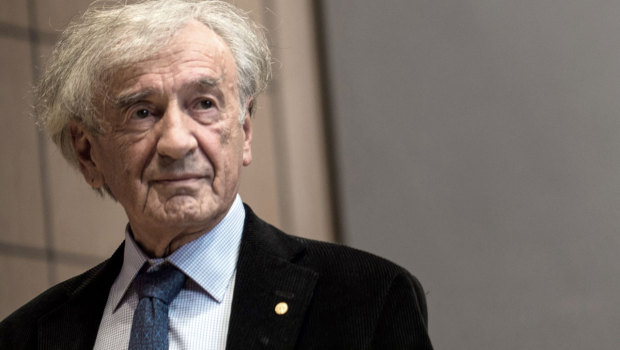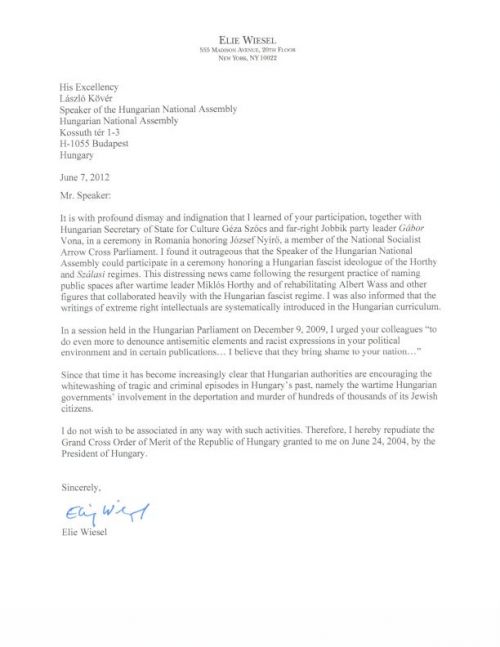Elie Wiesel in a fit of pique over honor for Hungarian writer
Tuesday, June 19th, 2012
Elie Wiesel in 2012
By Carolyn Yeager (edited on June 21st)
Elie Wiesel is making news again by repudiating a Hungarian Government award he received in 2004. By this gesture, he apparently hopes to intimidate independent nation-states to take into consideration Jewish Power – Holocaust-Power – in every decision they make. Wiesel also likes to gain public attention for what he alleges to be the crimes of the Nazis and their collaborators.
The award Wiesel is returning (or is he? I cannot confirm that) is the Republic of Hungary’s Order of Merit, Grand Cross presented to him by president Ferenc Madl in 2004. Let’s hope he never gets it back.
Wiesel said last week that he was “outraged” that Hungarian House Speaker Laszlo Kover participated, together with Hungarian Secretary of State for Culture Geza Szocs and far-right Jobbik party leader Gabor Vona, in a re-burial ceremony in Romania honoring author Jozsef Nyiro, who was a member of the Arrow Cross Parliament during the 1930′s.
“It’s just too close to home,” Wiesel told an Associated Press interviewer. In a letter to Kover, he wrote “It is with profound dismay and indignation that I learned of your participation” with Szocs and Vona in a ceremony honoring “a fascist ideologue of the Horthy and Szalasi regimes”.
Background on Nyiro
From The failed reburial of József Nyirő in Transylvania, May 30, 2012 in the Buda Post:
József Nyirő was a Catholic priest who became a writer after Transylvania was annexed to Romania in 1920. His works, according to the government’s new draft curricula, should in future be taught in Hungarian high schools. In 1941, after the re-annexation of Transylvania to Hungary, Nyirő became a Member of Parliament in Hungary and as such went into exile in 1945. He died in Spain in 1953, and his last wish was to be buried in his homeland. At the initiative of the Hungarian Civic Party (MPP), a small Hungarian ethnic party in Transylvania, the Office of the Hungarian Parliament initiated his reburial. The new Romanian government, however, regards Nyirő as a Hungarian irredentist writer. Nyirő’s reburial, which was scheduled for Sunday (28 May) was cancelled after the Romanian authorities withdrew permission, claiming that the document carried the wrong registration number. Romanian PM Victor Ponta called the reburial a provocation.
A commemoration event was held instead of the reburial. What Elie Wiesel objects to is that three Hungarian officials attended the commemoration. Wiesel wants all-out condemnation of anyone and everyone who is painted as a “far right National-Socialist, fascist or antisemite.”
Here is the letter that Wiesel wrote to the Speaker of the Hungarian National Assembly. Sorry it is such poor quality. He writes in paragraph two that in 2009 he urged members of the National Assembly “to do even more to denounce antisemitic elements and racist expressions in your political environment and in certain publications … I believe they bring shame to your nation.”
He writes that since that time it has become worse, that Hungarian authorities are “whitewashing” Hungary’s criminal past.
Finally, “I do not wish to be associated in any way with such activities. Therefore, I hereby repudiate the Grand Cross Order of Merit … given to me on June 24, 2004 by the President of Hungary. He doesn’t say he is returning it, does he. But it is so reminiscent of his statements that he does not want to be in the same room with a “holocaust denier.” He clearly feels he’s being contaminated by those whose views are opposite to his.
And there is the famous Wiesel signature which doesn’t resemble at all the signature on the U.S. Military Questionaire signed by Lázár Wiesel in 1945. It was I who first thought to compare the signatures and brought it to light in September 2010.
Category Featured | Tags: Tags: Elie Wiesel, Josef Nyiro, Laszlo Kover, Republic of Hungary Order of Merit, Romania,
Social Networks: Facebook, Twitter, Google Bookmarks, del.icio.us, StumbleUpon, Digg, Reddit, Posterous.




